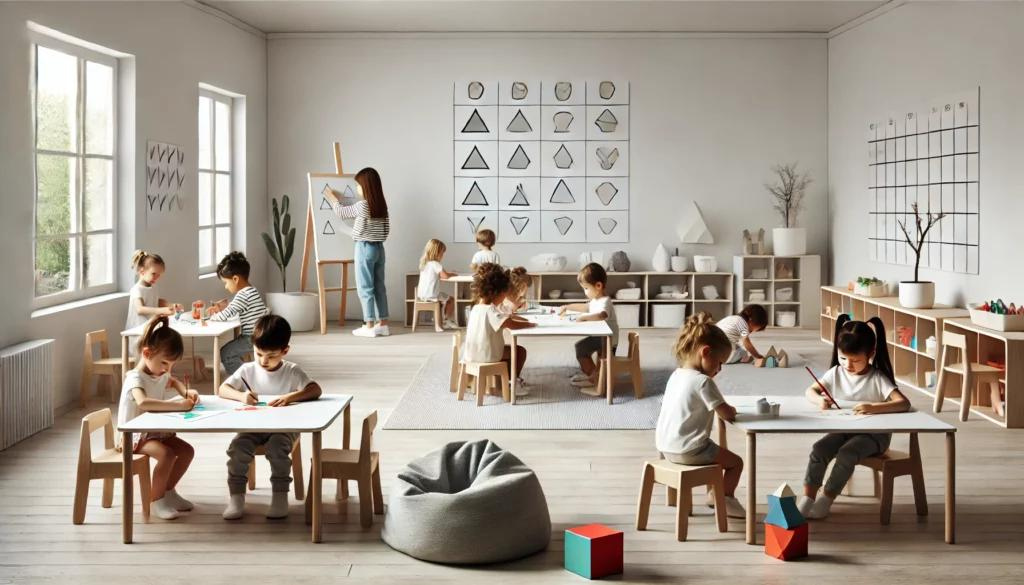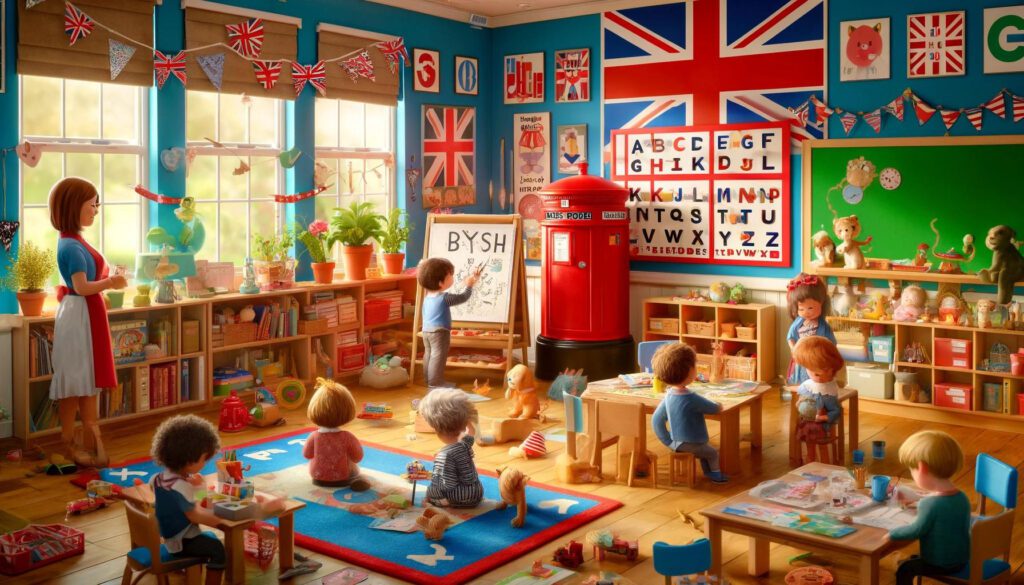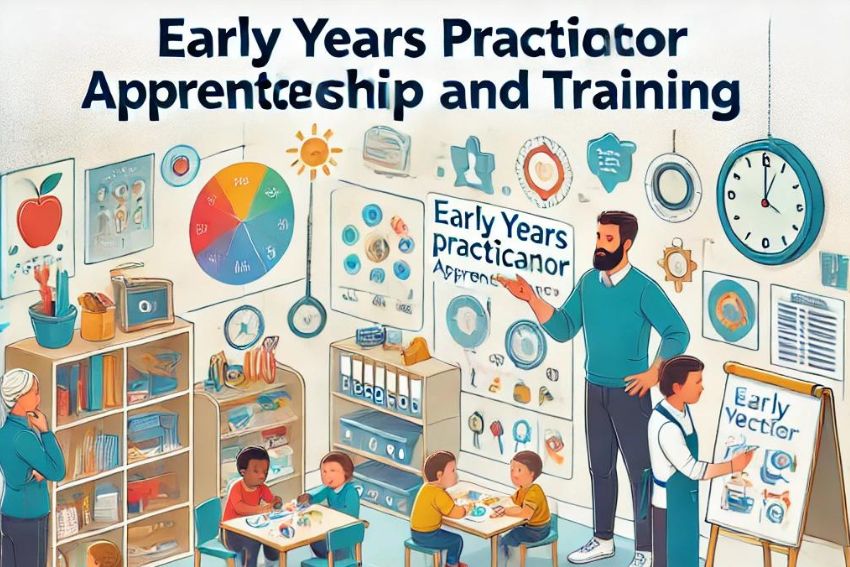An Early Years Practitioner plays a crucial role in the foundation of childhood education and developmental support. Specifically, defined as a professional who works with children from birth to age five. They are responsible for nurturing, educating, and supporting young children in various settings, including nurseries, schools, and private childcare facilities. Moreover, the importance of this profession cannot be overstated. EYPs provide essential support that promotes healthy development during critical formative years. Ultimately, their contributions lay the groundwork for children’s future learning and well-being.
The distinction between an Early Years Practitioner and an Early Years Educator is often subtle. While both roles involve working with young children, Early Years Educators may have a more specialized focus on EYFS curriculum development or teaching specific subjects. The second one, on the other hand, focuses more on the holistic development of children, which encompasses their social, emotional, physical, and cognitive growth. Furthermore, this distinction is vital, as it underlines the EYP’s role in fostering a safe and supportive environment where young children can thrive.

What are Roles and Responsibilities For YEP?
People who choose to work in early childhood education are responsible for a wide range of tasks. Here, you can explore a detailed breakdown of Early Years education roles and responsibilities and also. read about the Areas of Learning in the Early Years Foundation Stage, which are essential for fostering children’s development and learning during their formative years.
Daily Tasks:
- When you first arrive at the early years setting as a practitioner, you will set up the space and make sure it is secure and equipped for the day. welcoming kids and parents, easing young ones’ adjustment to the environment, and offering consolation to those who might want a little extra assistance.
- Being an early childhood educator requires Observation. You can give children high-quality care by keeping an eye on their interactions, interests, and developmental milestones. You can then identify each child’s unique requirements and design activities to meet those needs.
- As a group leader, you will be expected to facilitate structured activities that foster social, cognitive, and physical development. For example as story times, circle times, music and dance, or arts and crafts.
- Free play is just as vital as other activities. Since it gives kids the chance to explore, think creatively, and engage with peers to build vital social skills.
- As a practitioner, building a relationship of trust with the kids you work with is crucial. Spending one-on-one time with them enhances their communication and self-confidence in addition to fostering a relationship.
- Closing the Day: Making sure every child gets home safely, feeling proud of themselves, and eager for more fun and education the next day. After that, you’ll plan the following day’s materials and activities based on the curriculum objectives and the interests of the kids.
- Taking stock of the day’s events and noting your accomplishments, difficulties, and opportunities for growth will support your professional and personal growth.
Interaction with Parents and Staff:
- Building strong relationships with parents is essential. therefore, this can be achieved through regular communication, discussing children’s progress, and providing advice on early childhood development. Furthermore, these interactions foster trust and collaboration, leading to a more supportive environment for the child’s growth.
- Collaborating with fellow practitioners and educational staff to share insights on child development and curriculum strategies.
Support for Children with Special Needs
- Identifying developmental delays or disabilities in children is crucial. moreover, working closely with special education professionals helps to create inclusive activities and interventions tailored to individual needs. By collaborating with these experts and exploring more information, practitioners can ensure that every child receives the support they require to thrive.

Early Years Practitioner Qualifications and Skills
In order to become an Early Years Practitioner, you’ll need a combination of essential qualifications and soft skills.
Essential Qualifications:
- GCSEs: A minimum of five GCSEs (including English and Maths) is typically required.
- NVQ: Level 2 or Level 3 NVQ in childcare or early years care is essential for practical competency.
- Level 2/3/5 Certificates: Achievement of Practitioner qualifications from recognized institutions to ensure adherence to the industry standards.
Soft Skills:
- Communication: Excellent verbal and written communication skills.
- Patience: The ability to remain calm and patient in challenging situations.
- Creativity: A creative approach to planning and delivering activities.
- Empathy: Understanding and responding to the needs and emotions of young children.
- Teamwork: The ability to collaborate effectively with colleagues.
Careers in Early Childhood Education
Career pathways for Early Years Practitioners can be both rewarding and dynamic. We can assure you that with experience and additional qualifications, you can explore several career options within the field of early childhood education.
Various Career Pathways:
- Early Years Educator: A role typically requiring a Level 3 qualification, focusing more on curriculum delivery and child assessments.
- Management: You can pursue leadership roles such as nursery managers or early years coordinators, requiring Level 5 qualifications and additional management training.
- Early Years Advisor: Provide guidance and support to early years settings.
- Early Years Teacher: Teach in a primary school setting.
Progression Opportunities:
If you decide to build a career in early childhood education, you should know that progression opportunities often require additional qualifications, such as a Foundation Degree or BA in Early Years Education. Further certifications and experience can facilitate movement into specialized areas, such as:
- SENCO (Special Educational Needs Coordinator) for focused support on special needs education.
- Early Years Consultant roles, advising on best practices and supporting practitioners in various educational settings.

Yearly Ears Practitioner Apprenticeship and Training
For interested in entering the field, the Early Years Practitioner apprenticeship offers a practical route to acquiring essential skills and qualifications. In addition, it combines on-the-job training with formal education. As a result, apprentices gain hands-on experience while also benefiting from theoretical knowledge, making them well-prepared for their roles in early childhood education.
Types of Apprenticeships:
- Level 2 Apprenticeship: Suitable for those just starting. allows earn-while-you-learn opportunities in basic childcare competencies.
- Level 3 Apprenticeship: More advanced, building competencies needed for roles as an Early Years Educator, often covering more detailed educational theories and practices.
- Level 5 Apprenticeship: For those aspiring to managerial and supervisory roles, it is essential to focus on leadership skills and operational management within early years settings. Additionally, developing these competencies can significantly enhance your ability to effectively guide and support staff while promoting a positive environment for children. Ultimately, honing these skills will prepare you for the challenges and responsibilities that come with such positions.
How to Apply for an Early Years Practitioner Apprenticeship:
Interested candidates can apply through local colleges, childcare organizations, or dedicated apprenticeship websites. Furthermore, to apply for an apprenticeship, you’ll typically need to meet the entry requirements set by the provider. In addition, it is important to prepare any necessary documents and information ahead of time to ensure a smooth application process. The benefits of taking an apprenticeship route include gaining practical experience while also earning a qualification, and a salary and making it a compelling pathway for many.
Salary Ranges
As an Early Years Practitioner you can find employment in various settings, including:
- Nurseries: Private or council-run childcare settings.
- Schools: Preschool or reception classes.
- Private childcare: Family child care or nannying
In this field, your salary can vary based on experience, qualifications, and employment settings. For instance, individuals with more experience typically earn higher salaries, while those with advanced qualifications may also command a better wage. Additionally, salaries can differ significantly depending on whether one is employed in a private childcare setting or a public educational institution.
- Entry-Level (Unqualified): Approx. £18,000 – £20,000.
- Qualified (Level 2/3): Approx. £20,000 – £25,000.
- Experienced (Level 5/Management): Approx. £25
Common Challenges and Strategies for Maintaining Well-being
Working in early years education can be rewarding but also challenging. Here are some common challenges that may accrue while working as an EYP:
- Long hours: Early morning and late evening shifts.
- Emotional demands: Dealing with the emotional needs of young children.
- Physical demands: Caring for and interacting with active children.
To overcome these challenges and maintain your well-being, it would be great to consider the following strategies:
- Self-care: Prioritize your physical and mental health through exercise, relaxation techniques, and adequate sleep.
- Support networks: Build strong relationships with colleagues and mentors for support and guidance.
- Work-life balance: Set boundaries and manage your workload effectively.
Conclusion
Remember, Early Years Practitioners play a vital role in shaping the lives of young children. Moreover, their dedication, patience, and expertise contribute to the development of future generations. If you have a passion for working with children and enjoy a fast-paced environment, then a career in early childhood education could be the perfect choice for you. By taking the initiative to gain the necessary qualifications and develop essential skills, such as those provided by Yearly Years Tutors, you can make a meaningful impact on the lives of young children and contribute to their positive development.








